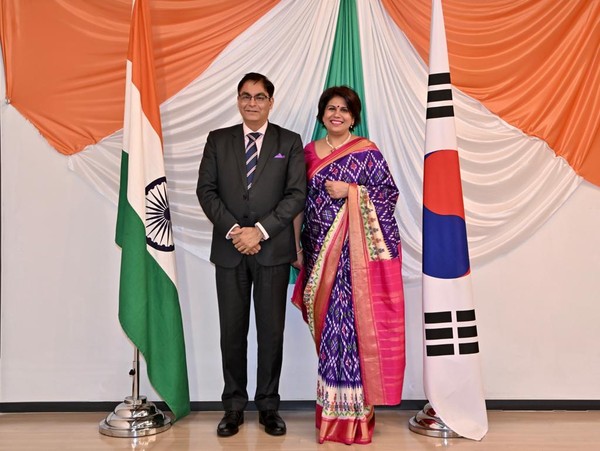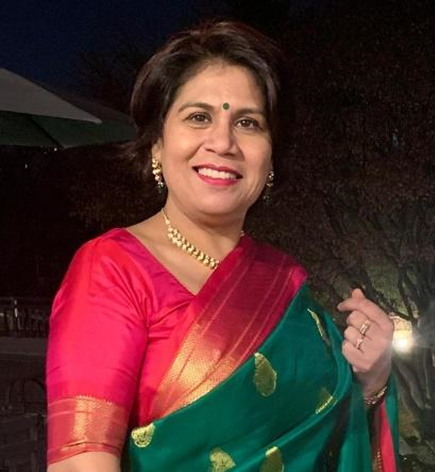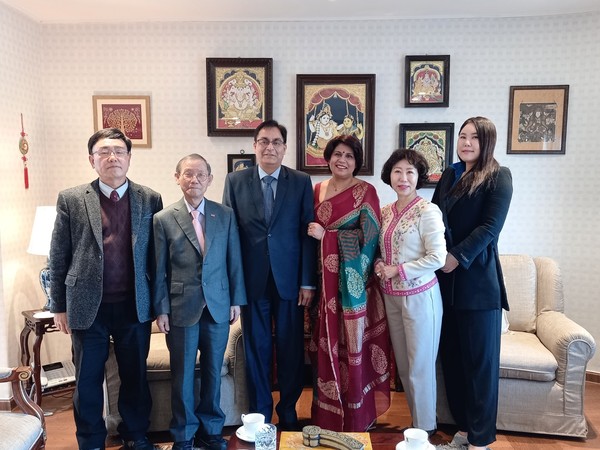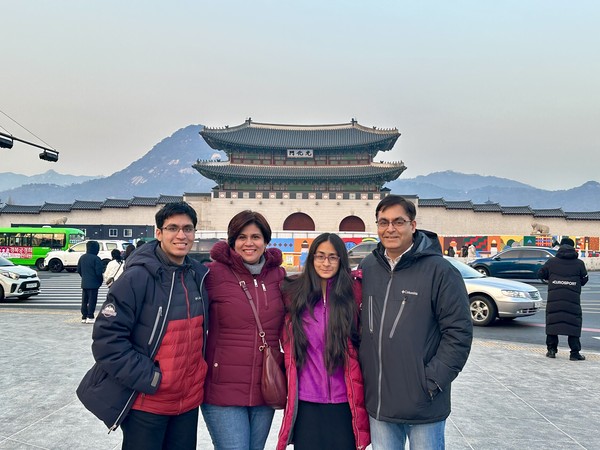Says Surabhi Kumar, spouse of Ambassador Amit Kumar of India in Seoul, at an interview with The Korea Post
“I think that the role of the spouse and family of a diplomat is quite unique. While the professional diplomats represent their country, the spouse and the family also play an important role,” said Surabhi Kumar, spouse of Ambassador Amit Kumar of India in Seoul.
In an interview with The Korea Post media, publisher of 3 English and 2 Korean language news publications since 1985, Madam Kumar said, “As the spouse of a career diplomat, I play a significant role in representing my country and in providing a window into socio-cultural aspects of India.

She continued to say, “We come from a country which is incredibly diverse in terms of very rich history, vibrant cultural traditions, linguistic heritage and religions.
“As a spouse of ambassador, I believe it is important for me to also raise awareness about different facets of India among the Korean people, and promote mutual understanding and friendship,” she said.
The followings are excerpts from an interview with Surabhi Kumar, spouse of Ambassador Amit Kumar of India in Seoul.
Question: Please Introduce yourself. Women played a great role throughout the history of Korea, including Madam Shin Saimdang. Please introduce yourself and your family.
Answer: I am an educator and the spouse of a career diplomat. Over the past two decades, I have worked in several international schools in Berlin, New York, Tokyo, Delhi, Washington and Chicago. I specialize in teaching English and Mathematics to young children. This opportunity to have a positive impact on and to mould young minds has brought great satisfaction and joy. I have an Undergraduate Degree in Commerce and Postgraduate Diploma in Finance.
I am an avid reader, am fond of traveling, and sampling local cultures & cuisines. My spouse Amit Kumar is the Ambassador of India to the Republic of Korea. We have two teenage children, one of them in college.
Through my travels, I have juggled to wear several hats. Whether it is that of a mother who ensured that the children settled into their new environments, to a wife who walked not one step behind but rather with her partner, to a homemaker who opened her heart and home to the world and gave them a glimpse into modern India and that of an educator, who is passionate to have a positive impact on young minds.
The issue of women empowerment and gender equality is very close to my heart. I believe that each role is important- in a family, whether you choose to go out to work or be a stay-at-home parent each comes with its own set of challenges. No role has a gender- it is we who have categorized jobs as being linked to male or female.
You have talked about Madam Shin Saimdang, and I feel that both South Korea and India are cultures that are replete with examples of strong women- women who have been pioneers of their times and who have continued to inspire generations of women. One such example we have is that of Rani Laxmibai who was thrust into the task of ruling a kingdom when her husband died. She took on the role with utmost sincerity and maturity. She led her people from the front, refusing to surrender to the British forces. Even today in India, young girls learn about courage in the face of adversity through her stories.

Q: Who is the First Lady of your esteemed country and the First Family. This is very important for the First Lady of Korea and the First Family.
A: Interestingly, the current President of India is Droupadi Murmu, a 64-year-old woman leader from Odisha, so we don’t have a First Lady at the moment. She is the second woman President of India. Her journey both in government and politics has been quite inspirational. Born on June 20, 1958, in Odisha's Mayurbhanj in the Santhal community, she had to struggle with poverty in her childhood in one of the most remote and underdeveloped districts of the country. She has a bachelor's degree in Arts from Ramadevi Women's College in Bhubaneswar.
In India, the First Lady or in one case, the First Gentleman, has largely had a ceremonial role. The first spouse has no official duties, but he or she generally attends the official ceremonies and functions held at the Rashtrapati Bhavan along with the president. Our former First Ladies have accompanied their husband on state visits and have been the public face of "Indian Women" during their presidency and have in a way promoted cultural diplomacy.
Responsible for implementing social welfare programs that originate from the president's office, they have also worked on and supported several social causes and rights for women and children in India during their time as the First Lady. One of our former First Ladies was a member of the Parliament herself. Another former First Lady Mrs. Vimla Sharma also simultaneously served as the Minister of State of the Ministry of Consumer Affairs, Food and Public Distribution and Minister of State for the Ministry of Women and Child Development in early 1990s.
The role of a First Lady is without a rule book really. The role is continuously defined and redefined by the unique personalities, capabilities, and active engagement of the women who serve in the office. Historically, the role of a first lady has been associated with that of a hostess. In this capacity, first ladies are expected to fulfill ceremonial responsibilities such as coordinating social gatherings, greeting guests, and attending events with their husbands.
Q: Who are the most prominent ladies in your country other than the First Lady, such as the women leaders in the political world, business circles, social and other areas? Please introduce them in detail.
A: We are noticing that worldwide, cultures are steadily moving towards gender equality, stereotypes are being challenged and diverse representation of women is becoming more visible across fields. However, this remains a work in progress. Advocacy, inclusive mindsets and tangible action are needed from all.
Indian women are increasingly playing a more prominent role in all walks of life, be it, political, economic, media, cultural or sports. Over the years, we have already had a woman President, Prime Minister, Speaker of Parliament, several Cabinet Ministers, Chief Ministers of provinces, etc. If you look at the business and economics area, you will find women heading major healthcare groups, financial groups, consultancies, large businesses, some considered traditionally male dominated such as steel, oil and natural gas, as well as new age companies such as digital companies, biotechnology, start-ups etc.
At the same time, we should not consider women empowerment, simply by looking at participation of women in the workforce, which no doubt is a very important economic indicator. Beyond the obvious equal pay for equal work, we all collectively need to underline the importance of issues such as women in decision making, agenda setting, burden sharing at home, etc. We also need to recognise that sometimes women may decide not to work but nonetheless they can and should play an important role in the socio-economic fabric of any society. The Indian women are participating in their families not only as wives and mothers but also as decision-makers and family heads. Marriage and motherhood continue to be part of women's lives but they are re-inventing these family roles without giving up their self-identities.
To conclude on this issue, I would like to share this thought: Women are leaders everywhere you look - from the CEO who runs a Fortune 500 company to the housewife who raises her children and heads her household.

Q: Please introduce the society activities of Madam, including the Korean ladies who are most friendly with Madam and your country—in the government, business and other areas?
A: I have been in your beautiful country for only 5 months. I have had the privilege to meet with both the First Lady and the spouse of the Foreign Minister. I was struck by their warmth, kindness and how knowledgeable they are about other countries too. I am impressed by the work-life balance they seem to have found, especially since as the spouse of a leader, they have a public persona too. I have also met spouses of former Ambassadors of Korea to India and share a sense of camaraderie with them. I have been fortunate to meet Korean women from different walks of life- they are entrepreneurs, journalists like yourself, professors, social activists, artists etc. What has struck me is how beautifully they have woven together the traditional aspects of Korean culture with the modern aspects of life today! Korean women are humble and soft-spoken, but you can sense their ambition, grit and determination to succeed in everything they take up.
The role of the spouse and family of a diplomat is quite unique. While the professional diplomats represent their country, the spouse and the family also play an important role. As the spouse of a career diplomat, I play a significant role in representing my country and in providing a window into socio-cultural aspects of India. We come from a country which is incredibly diverse in terms of very rich history, vibrant cultural traditions, linguistic heritage and religions; have a democratic polity and a dynamic economy with the intent and ambition to significantly raise the quality of lives of our people.
As a spouse, I believe it is important for me to also raise awareness about different facets of India among the Korean people, and promote mutual understanding and friendship. I am involved in many activities to realize these objectives, sometimes in association with local organizations such as ASAS, SIWA and the Garden Club. I am also learning about Korea, its beautiful culture and traditions, cuisine, Hallyu, etc. It is equally fascinating to learn of ancient bonds of kinship between our two countries, discover more about the shared heritage of Buddhism and our contemporary links.
Q: Korean people, especially the up-and-coming Korean businessmen need rest and recuperation. What are your tourist attractions?
A: India is a fascinating tourist destination with a multitude of experiences to offer to travelers of all kinds. The country has everything from the globally recognized forty UNESCO World Heritage sites, to exquisite wildlife, beautiful beaches, adventure tourism, and a variety of cuisine and cultural experiences. The country is dotted with many spiritual destinations which should not be missed by anyone looking for spiritual upliftment or seeking mental solace in this fast paced world.
We have the Buddhist tourist circuit covering several prominent Buddhist heritage sites including those directly related to the life of Lord Buddha. The two countries are well connected by Direct Flights operated by Air India and Korean Air. Flights have resumed and are reaching pre-COVID frequencies. We should, however, work to have more direct flights. Obtaining a tourist visa for India is also very easy and convenient. So, we warmly welcome our Korean friends to visit India and explore its endless and timeless beauty and grandeur.

Q: What are the most important festive days in your country? Please elaborate.
A: India is the birthplace of 4 major religions (Hinduism, Buddhism, Jainism and Sikhism) and home to followers of all religions. Given our diversity, one encounters an astonishing range of festivals. The two most important festivals are Diwali and Holi. Diwali or Deepawali is known as festival of lights and is celebrated to mark the return of Lord Ram to his homeland after 14 years in exile. During this period, Lord Rama defeated the mighty Demon, king, Ravana, and thus the festival symbolizes victory of good over evil, light over darkness and knowledge over ignorance. On the eve of Holi, also known as the festival of colors, people make huge bonfires and the next, Holi, the people gather in open areas and apply dry and wet colors of multiple hues to each other, with some carrying water guns and colored water-filled balloons. The festival marks the arrival of spring and legend has it that it started with Krishna and Radha playing with colors. Very often people of all faiths join in celebrating each other’s festivals in India. Growing up, I vividly remember partaking in festivities associated with Eid, Christmas, Guru Nanak Jayanti, Buddh Purnima, etc.
Q: Please add whatever other details that Your Excellency might consider to be important.
A: I have had the opportunity to live in different parts of the world. Through my moves across the world, I managed to forge friendships with women from different backgrounds, cultures and ethnicities. These women have at different stages in my life helped my growth as an individual. They have been there to lift me up, to welcome me into the struggle, and to teach me more about the myriad issues that affect women. As we near the International Women’s Day on March 8, I would like to acknowledge it as a chance to celebrate that sisterhood, while also renewing our energy to keep moving forward. We as women are each other’s biggest allies. After all, an empowered woman empowers other women!

